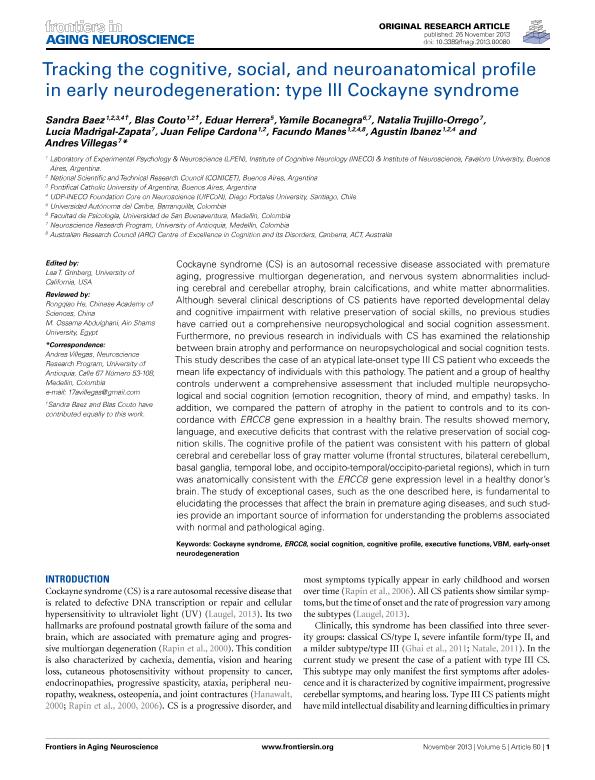Mostrar el registro sencillo del ítem
dc.contributor.author
Báez Buitrago, Sandra Jimena

dc.contributor.author
Couto, Juan Blas Marcos

dc.contributor.author
Herrera, Eduar
dc.contributor.author
Bocanegra, Yamile
dc.contributor.author
Trujillo Orrego, Natalia
dc.contributor.author
Madriga Zapata, Lucia
dc.contributor.author
Cardona Londoño, Juan Felipe

dc.contributor.author
Manes, Facundo Francisco

dc.contributor.author
Ibañez, Agustin Mariano

dc.contributor.author
Villegas, Andres
dc.date.available
2019-11-13T21:54:17Z
dc.date.issued
2013-11
dc.identifier.citation
Báez Buitrago, Sandra Jimena; Couto, Juan Blas Marcos; Herrera, Eduar; Bocanegra, Yamile; Trujillo Orrego, Natalia; et al.; Tracking the cognitive, social, and neuroanatomical profile in early neurodegeneration: Type III Cockayne syndrome; Frontiers Research Foundation; Frontiers in Aging Neuroscience; 5; 80; 11-2013; 1-18
dc.identifier.issn
1663-4365
dc.identifier.uri
http://hdl.handle.net/11336/88820
dc.description.abstract
Cockayne syndrome (CS) is an autosomal recessive disease associated with premature aging, progressive multiorgan degeneration, and nervous system abnormalities including cerebral and cerebellar atrophy, brain calcifications, and white matter abnormalities. Although several clinical descriptions of CS patients have reported developmental delay and cognitive impairment with relative preservation of social skills, no previous studies have carried out a comprehensive neuropsychological and social cognition assessment. Furthermore, no previous research in individuals with CS has examined the relationship between brain atrophy and performance on neuropsychological and social cognition tests. This study describes the case of an atypical late-onset type III CS patient who exceeds the mean life expectancy of individuals with this pathology. The patient and a group of healthy controls underwent a comprehensive assessment that included multiple neuropsychological and social cognition (emotion recognition, theory of mind, and empathy) tasks. In addition, we compared the pattern of atrophy in the patient to controls and to its concordance with ERCC8 gene expression in a healthy brain. The results showed memory, language, and executive deficits that contrast with the relative preservation of social cognition skills. The cognitive profile of the patient was consistent with his pattern of global cerebral and cerebellar loss of gray matter volume (frontal structures, bilateral cerebellum, basal ganglia, temporal lobe, and occipito-temporal/occipito-parietal regions), which in turn was anatomically consistent with the ERCC8 gene expression level in a healthy donor's brain. The study of exceptional cases, such as the one described here, is fundamental to elucidating the processes that affect the brain in premature aging diseases, and such studies provide an important source of information for understanding the problems associated with normal and pathological aging.
dc.format
application/pdf
dc.language.iso
eng
dc.publisher
Frontiers Research Foundation

dc.rights
info:eu-repo/semantics/openAccess
dc.rights.uri
https://creativecommons.org/licenses/by-nc-sa/2.5/ar/
dc.subject
COCKAYNE SYNDROME
dc.subject
COGNITIVE PROFILE
dc.subject
EARLY-ONSET NEURODEGENERATION
dc.subject
ERCC8
dc.subject
EXECUTIVE FUNCTIONS
dc.subject
SOCIAL COGNITION
dc.subject
VBM
dc.subject.classification
Psicología

dc.subject.classification
Psicología

dc.subject.classification
CIENCIAS SOCIALES

dc.title
Tracking the cognitive, social, and neuroanatomical profile in early neurodegeneration: Type III Cockayne syndrome
dc.type
info:eu-repo/semantics/article
dc.type
info:ar-repo/semantics/artículo
dc.type
info:eu-repo/semantics/publishedVersion
dc.date.updated
2019-10-21T13:35:24Z
dc.journal.volume
5
dc.journal.number
80
dc.journal.pagination
1-18
dc.journal.pais
Suiza

dc.description.fil
Fil: Báez Buitrago, Sandra Jimena. Consejo Nacional de Investigaciones Científicas y Técnicas; Argentina. Universidad Diego Portales; Chile. Pontificia Universidad Católica Argentina "Santa María de los Buenos Aires"; Argentina. Universidad Favaloro; Argentina. Instituto de Neurología Cognitiva; Argentina
dc.description.fil
Fil: Couto, Juan Blas Marcos. Consejo Nacional de Investigaciones Científicas y Técnicas; Argentina. Universidad Favaloro; Argentina. Instituto de Neurología Cognitiva; Argentina
dc.description.fil
Fil: Herrera, Eduar. Universidad Autónoma del Caribe; Colombia
dc.description.fil
Fil: Bocanegra, Yamile. Universidad de Antioquia; Colombia. Universidad de San Buenaventura; Colombia
dc.description.fil
Fil: Trujillo Orrego, Natalia. Universidad de Antioquia; Colombia
dc.description.fil
Fil: Madriga Zapata, Lucia. Universidad de Antioquia; Colombia
dc.description.fil
Fil: Cardona Londoño, Juan Felipe. Consejo Nacional de Investigaciones Científicas y Técnicas; Argentina. Universidad Favaloro; Argentina. Instituto de Neurología Cognitiva; Argentina
dc.description.fil
Fil: Manes, Facundo Francisco. Consejo Nacional de Investigaciones Científicas y Técnicas; Argentina. Australian Government, Australian Research Council; Australia. Universidad Diego Portales; Chile. Universidad Favaloro; Argentina. Instituto de Neurología Cognitiva; Argentina
dc.description.fil
Fil: Ibáñez Barassi, Agustín Mariano. Consejo Nacional de Investigaciones Científicas y Técnicas; Argentina. Universidad Diego Portales; Chile. Universidad Favaloro; Argentina. Instituto de Neurología Cognitiva; Argentina
dc.description.fil
Fil: Villegas, Andres. Universidad de Antioquia; Colombia
dc.journal.title
Frontiers in Aging Neuroscience
dc.relation.alternativeid
info:eu-repo/semantics/altIdentifier/doi/http://dx.doi.org/10.3389/fnagi.2013.00080
dc.relation.alternativeid
info:eu-repo/semantics/altIdentifier/url/https://www.frontiersin.org/articles/10.3389/fnagi.2013.00080
Archivos asociados
